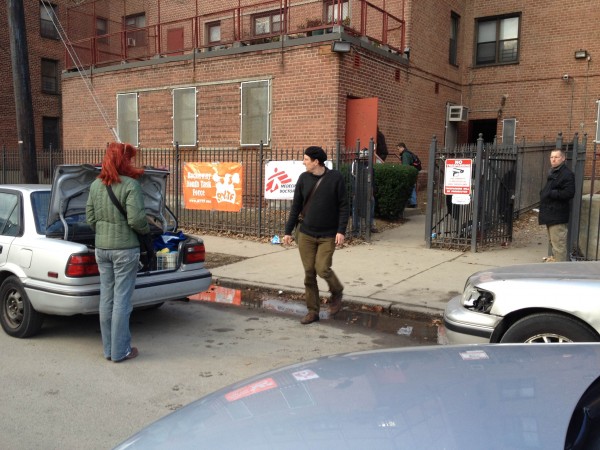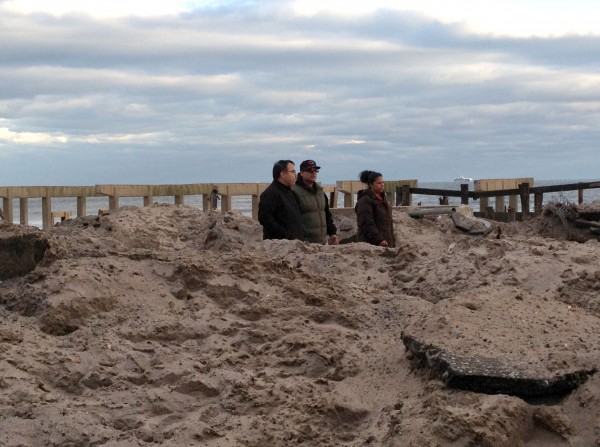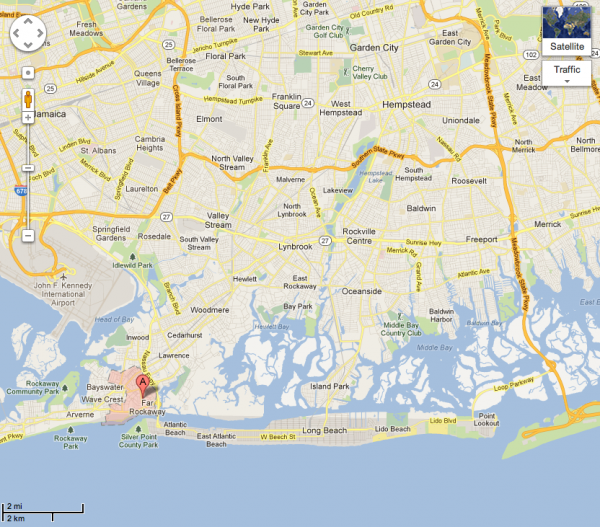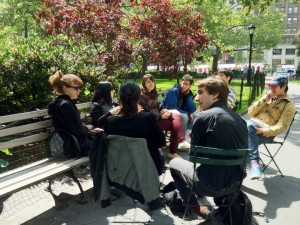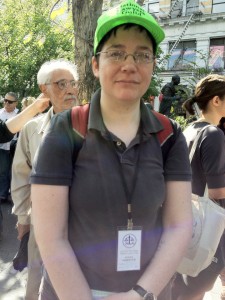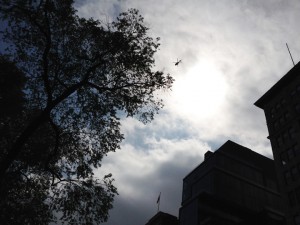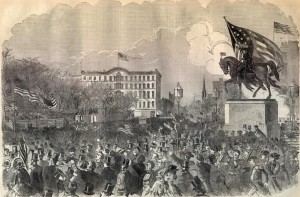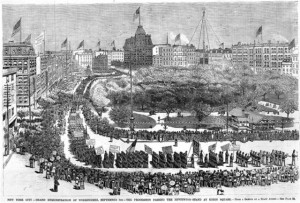Utopia
Lenore Malen Bio
I am a New York based interdisciplinary artist working with photo /video/audio installation, live performance and fiction writing. Through the lens of history and humor I’ve explored utopian longings and their dystopic aftermaths. In an era of ecological stress, I’ve taken a longer perspective looking at how this has played out in cultural myths and in our fraught relationship with non human animals. I have performed, exhibited and screened my films in the US and in Europe — on the BBC (Lion TV), The Mediations Biennale, Poznan, Poland, Zentrum Für Medienkunst (ZKM) Karlsruhe, The University of Geneva’s June 2015 conference Approaching PostHumanism and The Post Human, and in the US at Wave Hill, Tufts University, Wesleyan University, The Slought Foundation, The Cue Art Foundation, Studio 10, Participant, Inc, the SASE conference Welcome To The Anthropcene (Pace U) and at UCLA’s Art/Sci Center and Digital Arts Research Network, and elsewhere.
Leave a commentJustice by Lottery
Justice by Lottery — a random reallocation of goods and opportunities. In Dec. 1999 I curated The Lottery an exhibition of artwork inspired by games at Rotunda Gallery, Clinton St. Brooklyn. On opening night we held a lottery and two winners of the draw we awarded one person shows at the gallery, a month for each. Here are some pictures that I found today on an old hard drive.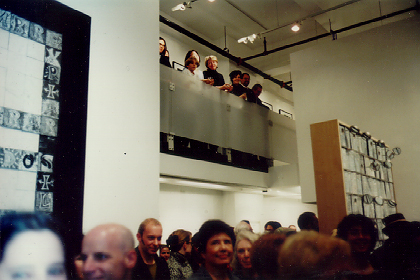
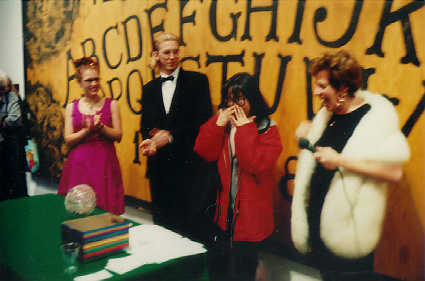
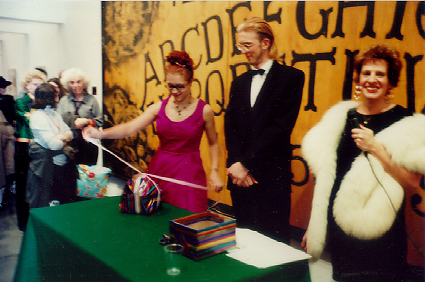
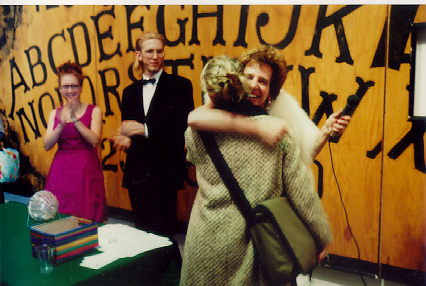
Plutarch: The Eating of Flesh
Plutarch
THE EATING OF FLESH
[Plutarch (c. 46-120) was educated in Athens and lectured in Rome. Best known for his “Lives” — a series of biographies of famous philosophers and politicians — Plutarch was also an esteemed philosopher in his own right. This essay is among his most frequently cited works.]
TRACT I
You ask of me then for what reason it was that Pythagoras abstained from eating of flesh. I for my part do much wonder in what humor, with what soul or reason, the first man with his mouth touched slaughter, and reached to his lips the flesh of a dead animal, and having set before people courses of ghastly corpses and ghosts, could give those parts the names of meat and victuals, that but a little before lowed, cried, moved, and saw; how his sight could endure the blood of slaughtered, flayed, and mangled bodies; how his smell could bear their scent; and how the very nastiness happened not to offend the taste, while it chewed the sores of others, and participated of the saps and juices of deadly wounds.
Crept the raw hides, and with a bellowing sound
Roared the dead limbs; the burning entrails groaned.
(“Odyssey,” xii. 395.)
This indeed is but a fiction and fancy; but the fare itself is truly monstrous and prodigious,–that a man should have a stomach to creatures while they yet bellow, and that he should be giving directions which of things yet alive and speaking is fittest to make food of, and ordering the several kinds of the seasoning and dressing them and serving them up to tables. You ought rather, in my opinion, to have inquired who first began this practice, than who of late times left it off.
And truly, as for those people who first ventured upon eating of flesh, it is very probable that the whole reason of their so doing was scarcity and want of other food; for it is not likely that their living together in lawless and extravagant lusts, or their growing wanton and capricious through the excessive variety of provisions then among them, brought them to such unsociable pleasures as these, against Nature. Yea, had they at this instant but their sense and voice restored to them, I am persuaded they would express themselves to this purpose:
“Oh! happy you, and highly favored of the gods, who now live! Into what an age of the world are you fallen, who share and enjoy among you a plentiful portion of good things! What abundance of things spring up for your use! What fruitful vineyards you enjoy! What wealth you gather from the fields! What delicacies from trees and plants, which you may gather! You may glut and fill yourselves without being polluted. As for us, we fell upon the most dismal and affrighting part of time, in which we were exposed by our production to manifold and inextricable wants and necessities. As yet the thickened air concealed the heaven from our view, and the stars were as yet confused with a disorderly huddle of fire and moisture and violent fluxions of winds. As yet the sun was not fixed to a regular and certain course, so as to separate morning and evening, nor did the seasons return in order crowned with wreaths from the fruitful harvest. The land was also spoiled by the inundations of disorderly rivers; and a great part of it was deformed with marshes, and utterly wild by reason of deep quagmires, unfertile forests, and woods. There was then no production of tame fruits, nor any instruments of art or invention of wit. And hunger gave no time, nor did seed-time then stay for the yearly season. What wonder is it if we made use of the flesh of beasts contrary to Nature, when mud was eaten and the bark of wood, and when it was thought a happy thing to find either a sprouting grass or a root of any plant! But when they had by chance tasted of or eaten an acorn, they danced for very joy about some oak or esculus, calling it by the names of life-giver, mother, and nourisher. And this was the only festival that those times were acquainted with; upon all other occasions, all things were full of anguish and dismal sadness. But whence is it that a certain ravenousness and frenzy drives you in these happy days to pollute yourselves with blood, since you have such an abundance of things necessary for your subsistence? Why do you belie the earth as unable to maintain you? Why do you profane the lawgiver Ceres, and shame the mild and gentle Bacchus, as not furnishing you with sufficiency? Are you not ashamed to mix tame fruits with blood and slaughter? You are indeed wont to call serpents, leopards, and lions savage creatures; but yet yourselves are defiled with blood, and come nothing behind them in cruelty. What they kill is their ordinary nourishment, but what you kill is your better fare.”
For we eat not lions and wolves by way of revenge; but we let those go, and catch the harmless and tame sort, and such as have neither stings nor teeth to bite with, and slay them; which, so may Jove help us, Nature seems to us to have produced for their beauty and comeliness only. [Just as if one seeing the river Nilus overflowing its banks, and thereby filling the whole country with genial and fertile moisture, should not at all admire that secret power in it that produces plants and plenteousness of most sweet and useful fruits, but beholding somewhere a crocodile swimming in it, or an asp crawling along, or mice (savage and filthy creatures), should presently affirm these to be the occasion of all that is amiss, or of any want or defect that may happen. Or as if indeed one contemplating this land or ground, how full it is of tame fruits, and how heavy with ears of corn, should afterwards espy somewhere in these same cornfields an ear of darnel or a wild vetch, and thereupon neglect to reap and gather in the corn, and fall a complaining of these. Such another thing it would be, if one– listening to the harangue of some advocate at some bar or pleading, swelling and enlarging and hastening towards the relief of some impending danger, or else, by Jupiter, in the impeaching and charging of certain audacious villanies or indictments, flowing and rolling along, and that not in a simple and poor strain, but with many sorts of passions all at once, or rather indeed with all sorts, in one and the same manner, into the many and various and differing minds of either hearers or judges that he is either to turn and change, or else, by Jupiter, to soften, appease, and quiet –should overlook all this business, and never consider or reckon upon the labor or struggle he had undergone, but pick up certain loose expressions, which the rapid motion of the discourse had carried along with it, as by the current of its course, and so had slipped and escaped the rest of the oration, and, hereupon undervalue the orator.]
But we are nothing put out of countenance, either by the beauteous gayety of the colors, or by the charmingness of the musical voices, or by the rare sagacity of the intellects, or by the cleanliness and neatness of diet, or by the rare discretion and prudence of these poor unfortunate animals; but for the sake of some little mouthful of flesh, we deprive a soul of the sun and light, and of that proportion of life and time it had been born into the world to enjoy. And then we fancy that the voices it utters and screams forth to us are nothing else but certain inarticulate sounds and noises, and not the several deprecations, entreaties, and pleadings of each of them, as it were saying thus to us: “I deprecate not thy necessity (if such there be), but thy wantonness. Kill me for thy feeding, but do not take me off for thy better feeding.” O horrible cruelty! It is truly an affecting sight to see the very table of rich people laid before them, who keep them cooks and caterers to furnish them with dead corpses for their daily fare; but it is yet more affecting to see it taken away, for the mammocks remaining are more than that which was eaten. These therefore were slain to no purpose. Others there are, who are so offended by what is set before them that they will not suffer it to be cut or sliced; thus abstaining from them when dead, while they would not spare them when alive.
Well, then, we understand that that sort of men are used to say, that in eating of flesh they follow the conduct and direction of Nature. But that it is not natural to mankind to feed on flesh, we first of all demonstrate from the very shape and figure of the body. For a human body no ways resembles those that were born for ravenousness; it hath no hawk’s bill, no sharp talon, no roughness of teeth, no such strength of stomach or heat of digestion, as can be sufficient to convert or alter such heavy and fleshy fare. But even from hence, that is, from the smoothness of the tongue, and the slowness of the stomach to digest, Nature seems to disclaim all pretence to fleshy victuals. But if you will contend that yourself was born to an inclination to such food as you have now a mind to eat, do you then yourself kill what you would eat. But do it yourself, without the help of a chopping-knife, mallet, or axe, –as wolves, bears, and lions do, who kill and eat at once. Rend an ox with thy teeth, worry a hog with thy mouth, tear a lamb or a hare in pieces, and fall on and eat it alive as they do. But if thou hadst rather stay until what thou greatest is become dead, and if thou art loath to force a soul out of its body, why then dost thou against Nature eat an animate thing? Nay, there is nobody that is willing to eat even a lifeless and a dead thing as it is; but they boil it, and roast it, and alter it by fire and medicines, as it were, changing and quenching the slaughtered gore with thousands of sweet sauces, that the palate being thereby deceived may admit of such uncouth fare. It was indeed a witty expression of a Lacedaemonian, who, having purchased a small fish in a certain inn, delivered it to his landlord to be dressed; and as he demanded cheese, and vinegar, and oil to make sauce, he replied, if I had had those, I would not have bought the fish. But we are grown so wanton in our bloody luxury, that we have bestowed upon flesh the name of meat [Greek omitted], and then require another seasoning [Greek omitted], to this same flesh, mixing oil, wine, honey, pickle, and vinegar, with Syrian and Arabian spices, as though we really meant to embalm it after its disease. Indeed when things are dissolved and made thus tender and soft, and are as it were turned into a sort of a carrionly corruption, it must needs be a great difficulty for concoction to master them, and when it hath mastered them, they must needs cause grievous oppressions and qualmy indigestions.
Diogenes ventured once to eat a raw pourcontrel, that he might disuse himself from meat dressed by fire; and as several priests and other people stood round him, he wrapped his head in his cassock, and so putting the fish to his mouth, he thus said unto them: It is for your sake, sirs, that I undergo this danger, and run this risk. A noble and gallant risk, by Jupiter! For far otherwise than as Pelopidas ventured his life for the liberty of the Thebans, and Harmodius and Aristogiton for that of the Athenians, did this philosopher encounter with a raw pourcontrel, to the end he might make human life more brutish. Moreover, these same flesh-eatings not only are preternatural to men’s bodies, but also by clogging and cloying them, they render their very minds and intellects gross. For it is well known to most, that wine and much flesh-eating make the body indeed strong and lusty, but the mind weak and feeble. And that I may not offend the wrestlers, I will make use of examples out of my own country. The Athenians are wont to call us Boeotians gross, senseless, and stupid fellows, for no other reason but our over-much eating; by Pindar we are called hogs, for the same reason. Menander the comedian calls us “fellows with long jaws.” It is observed also that, according to the saying of Heraclitus, “the wisest soul is like a dry light.” Earthen jars, if you strike them, will sound; but if they be full, they perceive not the strokes that are given them. Copper vessels also that are thin communicate the sound round about them, unless some one stop and dull the ambient stroke with his fingers. Moreover, the eye, when seized with an over-great plenitude of humors, grows dim and feeble for its ordinary work. When we behold the sun through a humid air and a great quantity of gross and indigested vapors, we see it not clear and bright, but obscure and cloudy, and with glimmering beams. Just so in a muddy and clogged body, that is swagged down with heavy and unnatural nourishments; it must needs happen that the gayety and splendor of the mind be confused and dulled, and that it ramble and roll after little and scarce discernible objects, since it wants clearness and vigor for higher things.
But to pass by these considerations, is not accustoming one’s self to mildness and a human temper of mind an admirable thing? For who would wrong or injure a man that is so sweetly and humanly disposed with respect to the ills of strangers that are not of his kind? I remember that three days ago, as I was discoursing, I made mention of a saying of Xenocrates, and how the Athenians gave judgment upon a certain person who had flayed a living ram. For my part I cannot think him a worse criminal that torments a poor creature while living, than a man that shall take away its life and murder it. But (as it seems) we are more sensible of what is done against custom than against Nature. There, however, I discussed these matters in a more popular style. But as for that grand and mysterious principle which (as Plato speaks) is incredible to base minds and to such as affect only mortal things, I as little care to move it in this discourse as a pilot doth a ship in a storm, or a comedian his machine while the scenes are moving; but perhaps it would not be amiss, by way of introduction and preface, to repeat certain verses of Empedocles. … For in these, by way of allegory, he hints at men’s souls, as that they are tied to mortal bodies, to be punished for murders, eating of flesh and of one another, although this doctrine seems much, ancienter than his time. For the fables that are storied and related about the discerption of Bacchus, and the attempts of the Titans upon him, and of their tasting of his slain body, and of their several punishments and fulminations afterwards, are but a representation of the regeneration. For what in us is unreasonable, disorderly, and boisterous, being not divine but demoniac, the ancients termed Titans, that is, TORMENTED and PUNISHED (from [Greek omitted]). …
TRACT II
Reason persuades us now to return with fresh cogitations and dispositions to what we left cold yesterday of our discourse about flesh-eating. It is indeed a hard and a difficult task to undertake (as Cato once said) to dispute with men’s bellies, that have no ears; since most have already drunk that draught of custom, which is like that of Ciree,
Of groans and frauds and sorcery replete.
(“Odyssey,” x. 234.)
And it is no easy task to pull out the hook of flesh-eating from the jaws of such as have gorged themselves with luxury and are (as it were) nailed down with it. It would indeed be a good action, if as the Egyptians draw out the stomach of a dead body, and cut it open and expose it to the sun, as the only cause of all its evil actions, so we could, by cutting out our gluttony and blood- shedding, purify and cleanse the remainder of our lives. For the stomach itself is not guilty of bloodshed, but is involuntarily polluted by our intemperance. But if this may not be, and we are ashamed by reason of custom to live unblamably, let us at least sin with discretion. Let us eat flesh; but let it be for hunger and not for wantonness. Let us kill an animal; but let us do it with sorrow and pity, and not abusing and tormenting it, as many nowadays are used to do, while some run red-hot spits through the bodies of swine, that by the tincture of the quenched iron the blood may be to that degree mortified, that it may sweeten and soften the flesh in its circulation; others jump and stamp upon the udders of sows that are ready to pig, that so they may crush into one mass (O Piacular Jupiter!) in the very pangs of delivery, blood, milk, and the corruption of the mashed and mangled young ones, and so eat the most inflamed part of the animal; others sew up the eyes of cranes and swans, and so shut them up in darkness to be fattened, and then souse up their flesh with certain monstrous mixtures and pickles.
By all which it is most manifest, that it is not for nourishment, or want, or any necessity, but for mere gluttony, wantonness, and expensiveness, that they make a pleasure of villany. Just as it happens in persons who cannot satiate their passion upon women, and having made trial of everything else and falling into vagaries, at last attempt things not to be mentioned; even so inordinateness in feeding, when it hath once passed the bounds of nature and necessity, studies at last to diversify the lusts of its intemperate appetite by cruelty and villany. For the senses, when they once quit their natural measures, sympathize with each other in their distempers, and are enticed by each other to the same consent and intemperance. Thus a distempered ear first debauched music, the soft and effeminate notes of which provoke immodest touches and lascivious tickling. These things first taught the eye not to delight in Pyrrhic dances, gesticulations of hands, or elegant pantomimes, nor in statues and fine paintings; but to reckon the slaughtering and death of mankind and wounds and duels the most sumptuous of shows and spectacles. Thus unlawful tables are accompanied with intemperate copulations, with unmusicianlike balls, and theatres become monstrous through shameful songs and rehearsals; and barbarous and brutish shows are again accompanied with an unrelenting temper and savage cruelty towards mankind. Hence it was that the divine Lycurgus in his Three Books of Laws gave orders that the doors and ridges of men’s houses should be made with a saw and an axe, and that no other instrument should so much as be brought to any house. Not that he did hereby intend to declare war against augers and planes and other instruments of finer work; but because he very well knew that with such tools as these you will never bring into your house a gilded couch, and that you will never attempt to bring into a slender cottage either silver tables, purple carpets, or costly stones; but that a plain supper and a homely dinner must accompany such a house, couch table, and cup. The beginning of a vicious diet is presently followed by all sorts of luxury and expensiveness,
Ev’n as a mare is by her thirsty colt.
=============
And what meal is not expensive? One for which no animal is put to death. Shall we reckon a soul to be a small expense? I will not say perhaps of a mother, or a father, or of some friend, or child, as Empedocles did; but one participating of feeling, of seeing, of hearing, of imagination, and of intellection; which each animal hath received from Nature for the acquiring of what is agreeable to it, and the avoiding what is disagreeable. Do but consider this with yourself now, which sort of philosophers render us most tame and civil, they who bid people to feed on their children, friends, fathers, and wives, when they are dead; or Pythagoras and Empedocles, that accustom men to be just towards even the other members of the creation. You laugh at a man that will not eat a sheep: but we (they will say again)–when we see you cutting off the parts of your dead father or mother, and sending it to your absent friends, and calling upon and inviting your present friends to eat the rest freely and heartily–shall we not smile? Nay, peradventure we offend at this instant time while we touch these books, without having first cleansed our hands, eyes, feet, and ears; if it be not (by Jupiter) a sufficient purgation of them to have discoursed of these matters in potable and fresh language (as Plato speaketh), thereby washing off the brackishness of hearing. Now if a man should set these books and discourses in opposition to each other, he will find that the philosophy of the one sort suits with the Seythians, Sogdians, and Melanchlaenians, of whom Herodotus’s relation is scarce believed; but the sentiments of Pythagoras and Empedocles were the laws and customs of the ancients Grecians.
Who, then, were the first authors of this opinion, that we owe no justice to dumb animals?
Who first beat out accursed steel,
And made the lab’ring ox a knife to feel.
In the very same manner oppressors and tyrants begin first to shed blood. For example, the first man that the Athenians ever put to death was one of the basest of all knaves, who had the reputation of deserving it; after him they put to death a second and a third. After this, being now accustomed to blood, they patiently saw Niceratus the son of Nicias, and their own general Theramenes, and Polemarchus the philosopher suffer death. Even so, in the beginning, some wild and mischievous beast was killed and eaten, and then some little bird or fish was entrapped. And the desire of slaughter, being first experimented and exercised in these, at last passed even to the laboring ox, and the sheep that clothes us, and to the poor cock that keeps the house; until by little and little, unsatiableness, being strengthened by use, men came to the slaughter of men, to bloodshed and wars. Now even if one cannot demonstrate and make out, that souls in their regenerations make a promiscuous use of all bodies, and that that which is now rational will at another time be irrational, and that again tame which is now wild,–for that Nature changes and transmutes everything,
With different fleshy coats new clothing all,–
this thing should be sufficient to change and show men, that it is a savage and intemperate habit, that it brings sickness and heaviness upon the body, and that it inclines the mind the more brutishly to bloodshed and destruction, when we have once accustomed ourselves neither to entertain a guest nor keep a wedding nor to treat our friends without blood and slaughter.
And if what is argued about the return of souls into bodies is not of force enough to beget faith, yet methinks the very uncertainty of the thing should fill us with apprehension and fear. Suppose, for instance, one should in some night-engagement run on with his drawn sword upon one that had fallen down and covered his body with his arms, and should in the meantime hear one say, that he was not very sure, but that he fancied and believed, that the party lying there was his own son, brother, father, or tent- companion; which were more advisable, think you,–to hearken to a false suggestion, and so to let go an enemy under the notion of a friend, or to slight an authority not sufficient to beget faith, and to slay a friend instead of a foe? This you will all say would be insupportable. Do but consider the famous Merope in the tragedy, who taking up a hatchet, and lifting it at her son’s head, whom she took for her son’s murderer, speaks thus as she was ready to give the fatal blow,
Villain, this holy blow shall cleave thy head;
(Euripides, “Cresphontes,” Frag. 457.)
what a bustle she raises in the whole theatre while she raises herself to give the blow, and what a fear they are all in, lest she should prevent the old man that comes to stop her hand, and should wound the youth. Now if another old man should stand by her and say, “Strike, it is thy enemy,” and this, “Hold, it is thy son”; which, think you, would be the greater injustice, to omit the punishing of an enemy for the sake of one’s child, or to suffer one’s self to be so carried away with anger at an enemy as to slay one’s child? Since then neither hatred nor wrath nor any revenge nor fear for ourselves carries us to the slaughter of a beast, but the poor sacrifice stands with an inclined neck, only to satisfy thy lust and pleasure, and then one philosopher stands by and tells thee, “Cut him down, it is but an unreasonable animal,” and another cries, “Hold, what if there should be the soul of some kinsman or god enclosed in him?”–good gods! is there the like danger if I refuse to eat flesh, as if I for want of faith murder my child or some other friend?
The Stoics’ way of reasoning upon this subject of flesh-eating is no way equal nor consonant with themselves. Who is this that hath so many mouths for his belly and the kitchen? Whence comes it to pass, that they so very much womanize and reproach pleasure, as a thing that they will not allow to be either good or preferable, or so much as agreeable, and yet all on a sudden become so zealous advocates for pleasures? It were indeed but a reasonable consequence of their doctrine, that, since they banish perfumes and cakes from their banquets, they should be much more averse to blood and to flesh. But now, just as if they would reduce their philosophy to their account-books, they lessen the expenses of their suppers in certain unnecessary and needless matters, but the untamed and murderous part of their expense they nothing boggle at. “Well! What then?” say they. “We have nothing to do with brute beasts.” Nor have you any with perfumes, nor with foreign sauces, may some one answer; therefore leave these out of your banquets, if you are driving out everything that is both useless and needless.
Let us therefore in the next place consider, whether we owe any justice to the brute beasts. Neither shall we handle this point artificially, or like subtle sophisters, but by casting our eye into our own breasts, and conversing with ourselves as men, we will weigh and examine the whole matter. …
http://www.bravebirds.org/plutarch.html
2 Comments
Carter Ratcliff Poems on Utopia
Starlight
It is with great sorrow—and some reluctance—that I take up my pen to record the last days of Thomas More’s Utopia. The Utopians had never liked Mr. More, though they owed him everything. Their lives were each one a bore, and when they turned for amusement to his book, it was even worse.
“We’ve been had,” they cried, and rushed out together—some with the tools of their trades, others in their nightshirts.
Foolish Gods
Trees that make noise at night
these are listening devices.
The air invisible everywhere
carries out further surveillance.
But do not imagine
that a tree or the air or the darkness then
is doing the work of the gods.
Or if any of them ever does,
it doesn’t matter because
these are gods grateful for nothing
this world has ever done for them.
Do not imagine they live in our world.
They only stop by, foolish gods,
falling in love with mortals.
Imagine how foolish they are.
Or, no, don’t imagine that, imagine something
that better comports with your luck, the great good fortune
that gave you an imagination in the first place.
Imagine that all the gods love you
or some of them do, and one of them
has fallen in love with you.
Educated, morally sensitive,
you dwell on a sunny shore.
You are stirred to indignation
by the obscurities of the mystery cults,
by a brutally oppressive government indifferent
to the squalor, poverty, and illiteracy in which
the great majority lives.
The god in love with you sees what you are getting at
but doesn’t really care, is not visibly outraged
by a governing class that tramples on human rights
and impedes the daily distribution of justice.
This god believes in liberty, personal and political,
in the removal of irrational inequalities, and in truth,
which he is perfectly willing to join you in identifying,
at least to some degree, with scientific progress.
He believes in all that
but is not much concerned with his beliefs.
Or yours.
He wants you and will,
even if something distracts him, remember
to set the startled furnace of daylight
to the temperature that will persuade you,
suddenly, that it was not he
who wanted you but you
who so desperately wanted him.
Carter Ratcliff
Antigone
They would say,
you have got to chose.
I know,
was her reply, always
her reply, and she would add,
as they knew she would,
I have chosen the long shot.
Right, they would say
to themselves and to one another: the long shot,
but whose?
The camera’s
long shot or the gambler’s?
Baby needs new shoes.
But grown-ups need new truths.
So truth needs more detachment.
Detachment needs to be needed
by Justice, and Justice needs new scales.
Who will provide them?
Not Antigone,
for she lives in darkness
and the backlog of light
provides Justice with her blindfold,
from beneath which she would peek
if she were not afraid of what she might see.
I have chosen to live in darkness,
here with Antigone, says the god
who refereed the recent injustices.
Speak for yourself, says Antigone.
I haven’t chosen to live here in darkness.
I have chosen the long shot, and whatever it takes,
I will give, and when it is weary of taking, I will give it
still more, for I have chosen
to know the truth
—the long shot
is the only shot
with a payoff,
and if grown-ups
don’t like this truth, too bad,
there is only this one,
the truth that has chosen all of you,
in your nameless multitudes
and then chosen to lose track of you
amid the myriad small truths, the comic truths,
that compose the large and tragic truth of this landscape
where you have no choice but to live.
Carter Ratcliff
Robespierre
The city’s clatter
drives you mad, say those who live in the city.
Those who live in the country say that madness is a weed,
a thistle, a sap-filled cruelty suited best to soil
stretched thin over bedrock far removed
from the sunny and permeable pavements of the city,
the magnet whose fluctuating allure we measure
by tracing shifts in the force of our desire to leave it.
On an infrequent jaunt to the countryside,
the blood-stained leader said that nothing is rotten here.
Even the earth, that cradle of decay, smells sweet.
And all agreed for the lamp of expertise,
working in the shadow of its Pinocchio-nose,
had taught even the olfactory image what to do, how to fit itself
to meaning too neatly, and so the nightmare could only fail
to qualify as madness.
And then the Revolution failed,
for expertise had liberated the people
from the very idea of history as an enemy to oppose.
Robespierre
recrossed his legs, the one
that supported the other being
now in its turn supported.
From the greater forms of madness,
the people must learn to oppose themselves.
They must learn to believe, he continued,
that revolutionary government is liberty’s despotism
ranged against tyranny.
Accused of playing god, he replied, I am not
playing god. I am being human.
Light from nowhere
goes nowhere. It is everywhere and forms all forms.
Every presence illuminates itself and all is darkness
for want of contrast.
Robespierre said near the end that from a certain angle
any fool could see that to be a revolutionary force the people
need not be mad. They need only love themselves.
As for the mad, if they are to be sane,
they need not love reason. They need only love themselves.
On this theorem
he built the throbbing geometry of the Terror, and from it
worked out corollaries of portico and autumn
leaf plastered wetly to newish stone and old light
at rest in the down on a nape bent archly
to the weight of the elegance of his proof
that self-love is the revolutionary lever
that wrenches open with perpetual screech the gateway
to the royal road to the rule of madness, legitimate
and eternal, if only the screeching would stop.
You see,
self-love was to be silenced by its cruelest corollary:
love of one’s interrogator, allegorical figure
of the joy of hearing one’s own voice tirelessly pacing
the length and graveled breadth of current events.
To resist in the name of one’s sanity
was to give in to what was now
our most subtly demented institution: history,
or that which had not been,
or not exactly.
In monumental falsehood,
we found a modest truth. Having come from nowhere,
we could not be said to be lost. But where,
in this rudely harvested field of data,
could we possibly be said to be going?
Agreeing to notice our dilemma,
Robespierre handed us a ring of keys.
Then we misplaced it, like altruism’s exact address
in the small and crumbling pyramid of modern manners.
Does altruism have a terrace?
A window?
In any case, the great project continues.
The mad are talked to. The city is abandoned.
So is the countryside, ensuring that both feel overcrowded
and lost to any future we might possibly want to live.
Carter Ratcliff
Angels
for George Quasha
They told me who made them. I told them I suspected as much. They told me how they were configured and I said, I don’t care about that, the puzzle of your inward structure. It is elegant, no doubt, but I care only about your outward behavior. What you do in the world.
They said, in a chorus, that’s silly. What we do in the world always follows, conclusion from premise, from how we were made by the one who made us, and I said, nonsense, between the intent and the act there is always a shadow, unless, of course, the act is the shadow, and then there is an abyss.
They said, we see where you go wrong. You think there is intent. You really think that but there is none, there is only the inward structure, the work of the one who made us, who laughs when you say that nature abhors a vacuum.
Nature loves a vacuum, and, if that love nearly always goes unrequited, it is cherished, it is requited to perfection, on those occasions when angels intervene. I said, you are angels and you talk like angels, and the one who made you is the devil. He made you to talk of big things like perfection.
You talk like angels and you draw like angels and you want to draw me the big picture. But don’t do that. Don’t draw me the big picture. I want to see the small picture, the myriad small pictures, filled with myriad details. They said, we are angels and we talk like angels and so you must listen and be careful, the devil is in the details. I said, no, you are wrong, the devil is in the big picture. In the details is redemption.
Leave a comment
Brief Report on Far Rockaway—Nov. 3rd 2012
Hoping to help the victims of Hurricane Sandy Jackie Brookner and I took some provisions — water, cleaning supplies, clothes — to an Aid Distribution Center on Far Rockaway in Queens, NY on Saturday afternoon, Nov. 3
We were part of a coordinated relief effort organized by Occupy Sandy which itself represents a coalition from Occupy Wall Street, 350.org, interoccupy.net, and Recovers.org.
We drove to Far Rockaway from an Occupy Sandy aid distribution center on Nevins Street in Brooklyn via the Belt Parkway (skirting the east side of Brooklyn and the Broad Chanel Wetlands) and then proceeded due south on the Cross Way Blvd. It’s a beautiful ride on any day, but the reflection of the mid afternoon light and low gray clouds on the wetlands made it especially lovely this past Saturday.
But when we finally arrived at the beach it looked like a war zone in the aftermath of a bombing. Piles of debris (sheet rock, drenched wood, furnishings) lined the streets outside neat wood frame and brick houses making them nearly impassable. The boardwalk itself had been lifted in whole sections and deposited across the road from the water’s edge. The beach was washed away, the sand piled up in 4 and 5 ft mounds. There was still no power, few people had returned, and military helicopters were flying overhead. Jackie watched a man scooping handfuls of sand onto the street from his living room window. As always the housing projects seemed the worst off. Here are some pictures that I took with my cellphone.
With all this destruction it was heartening to see some dedicated volunteers at the community drop-off center, on the beach, and a few other locations.
Nov. 5th—I read today that there are now hundreds of volunteers working in all the outlying communities that were devastated by Sandy. And a lot of people are asking: Do we cede these areas to the sea? Should anyone be living so close to open ocean ? These are painful questions: 115 thousand people live in the Rockaways and Broad Channel. Generations have grown up here. For them relocation must seem unthinkable in any timetable, and the one of the most difficult questions as always is: who will pay?
You can learn a lot about the area on the web:
Rockaway itself is a barrier split, inherently unstable and constantly changing in response to natural and human forces. Six openings or tidal inlets separate the barriers and connect the bays with the ocean. All of the inlets are artificially stabilized with structures and are dredged to allow for navigation by commercial and recreational boats.
The name “Rockaway” may have originally meant “place of sands” in the Munsee language of the Native American Lenape. Other spellings include Requarkie, Rechouwakie, Rechaweygh, Rechquaakie and Reckowacky (see: Toponymy of New Netherland).[2]
Leave a comment
The Free University—Madison Square Park, NY, Sept 21, 2012
Quilting and Debt: A short video shot during the week-long Free University held at Madison Square Park, NY.
occupywallst.org/
occupywallst.org/article/free-university-nyc-s18-s22/
To mark the one year anniversary of Occupy Wall Street, a coalition of students, educators, and community groups will host the Free University Week—creating education that is democratic, critical, and accessible to all. This event will be held in Madison Square Park from Tuesday through Friday, September 18 – 21, from 2pm to 7pm, and on Saturday, September 22, from 10am to 2pm. Participants will gather in solidarity with Occupy Wall Street’s one year anniversary, as well as with education movements in Chicago, Quebec, Chile, and beyond.
Just across the street from the Free University, on Tuesday evening, the Barack Obama presidential campaign will hold a $40,000 a plate fundraiser at the 40/40 Club, hosted by Jay-Z and Beyoncé and attended by the president. The cost and exclusivity of the event is a reminder of both the increasing concentration of wealth in U.S. society and the inaccessibility of the political system to ordinary people. “The fact that the 1% can spend $40,000 on an evening, while millions of people have tens of thousands of dollars in debt hanging over their lives for getting an education, shows that the system is out of balance. We need free education for all, as demonstrated in the Free University, now more than ever,” said organizer Carwil Bjork-James.
Of the over 130 scheduled workshops at the Free University Week, highlights include: ‘On Disasters and Encampments’ with Rebecca Solnit; ‘Occupying Language: A Conversation’ with Marina Sitrin and Dario Azzellini; ‘The NY Comics & Picture-story Symposium’ with Ben Katchor; ‘Strike Debt’ workshop series with Pamela Brown, George Caffentzis, Nick Mirzoeff, and Andrew Ross; ‘Student Unionism’ workshop series with a member of Quebec’s CLASSE student union, an Occupy Wall Street Screenprinters art shop, and an ‘Occupy Guitarmy’ musicianship certificate program.
The first Free University on May Day, 2012, welcomed over 2,000 participants for dozens of classes and workshops in Madison Square Park. This week-long reprise rides the momentum of Occupy Wall Street’s September 17 actions, in addition to other demonstrations against neoliberal assaults on democracy and social justice. These include the ongoing Chicago teachers’ strike, the recent victory of the ‘Hot and Crusty’ workers’ occupation in NYC, and the recent victory of the Quebec student movement that defeated a 75% tuition increase and ousted Premier Jean Charest. The Free University Week constitutes a hub of political education in New York City that will enhance the movement’s clarity, confidence, and direction for years to come.
OCCUPY YOUR EDUCATION WITH THE FREE UNIVERSITY WEEK
The Free University of NYC will host a week of free educational courses and events in Madison Square Park this September 18-22. Bringing together people from around the world, Free University will advocate for education as a human right and demonstrate our ability to implement free education for all.
OWS May 2012
From Perry Bard
May 13th 2012
Video Vortex 8
The Politics, Cultures and Art of Online Video
Museum of Contemporary Art, Zagreb, Croatia
Conference: May 17-19. Exhibition: May 17-30, 2012
OWS NY CURATORIAL STATEMENT
OWS is an organic leaderless movement inviting participation in the name of democracy. This video program curated online highlights its energy, creativity and diversity. The opening rant (01) calling for an end to the Federal Reserve, an end to the wars that make the 1% richer, an end to corruption, speaks quite clearly to the issues. Fragmented Mic Check (02_ Michael Nigro) introduces the peoples at Zuccotti Park and their diverse concerns. The human microphone evidenced in many of the videos was developed because amplified sound requires a permit in New York City. Videos 04,05,06 document the arrest of 700 protestors on the traffic lane of the Brooklyn Bridge. The arrests spawned OWS solidarity groups across the country. Responses to video 05 on Youtube argue the chaotic details of the march, some say the NYPD led and trapped the demonstrators.
Today occupy is a verb applied to banks, museums, foreclosed homes, cinema, libraries (09_ Ardele Lister & Damien Catera), you name it. Several of the videos target specific complaints: students protest tuition hikes (07_ Joan Logue), protesters enter a Citibank to move their money into Credit Unions, community-based alternatives to corporate entities (09), OWS joins the teamsters in a protest against Sotheby’s for locking out union workers (14_ Jim Costanzo), a marine who fought in Iraq and Afghanistan rants against the cops (16, with 40,963 comments). Video (18_ Joan Logue) focuses on foreclosures in East New York.
The number of respected public figures who lend their support by speaking at OWS General Assemblies, marching for OWS (Veterans #19), and being arrested (Naomi Wolf #12) legitimates the movement for a population that needs convincing. More theatre occurs in the form of street performance (#03 _ jim costanzo/www.aaronburrsociety.
OWS NY is a program of rage, humor and ingenious tactics all visible daily on the streets of New York.
May 1st 2012 New York City
May 1st fell on a Tuesday, one of the days I teach at Parsons The New School For Design. Rather than meet in a classroom I invited my MFA students to my 17th Street studio and then for a teach-in at Madison Square Park. We arrived at the Park at 1:30 PM where the teach-ins had already begun.
Around 2:30 PM we walked to Union Square and were immediately surrounded by hundreds of OWS protestors in a peaceful rally. It was a joy to participate in this protest and to think of the long tradition of such events in the park. In her recent biography of Emma Goldman, Vivian Gornick describes a political rally at Union Square that took place in August 1893.
“In August 1893, at the height of one of America’s worst depressions—tens of thousands unemployed, rally after rally demanding government relief, a hunger march on Washington—Emma gave one of her most provocative speeches. Standing on an overturned packing box in New York City’s Union Square, she cried out . . . at a crowd of 5000: “Men and women, do you not realize that the State is the worst enemy you have? It is a machine that crushes you in order to sustain the ruling class, your masters . . . . It is the pillar of capitalism, and it is ridiculous to expect any redress from it. Do you not see the stupidity of asking relief from Albany with immense wealth within a stone’s throw of here. . . .”
It’s unthinkable that a rally of this nature could take place in NYC today. What I saw in Union Square was a relatively small group of peaceful protestors and a massive overreaction by the recently militarized and emboldened NYPD. Police cars lined the streets for blocks and helicopters hovered overhead. Scroll way down to see historic pictures of workers gathering in this park.
A legal adviser.
Balloons.
One of a number of helicopters overhead.
Police cars everywhere.
Union Square—1860’s-1930’s
1860s—Civil War Riots
Imagining Edelia
Thursday April 12, 2012 at Parsons The New School for Design—A collective reading of David Harvey’s utopian fantasy, Edelia, the appendix to his book, Spaces of Hope that I’ve read many times. Reena Katz organized this event, which was attended by around 100 people, students and faculty seated in small groups in a big hall. Along with 8 other people I read out loud from the book while others listened. A wonderful evening with reverence for the book and for argument around it.
ARTISTS’ UTOPIA SITES
June 25th 2012 More from Reena Katz—An upcoming conference in Vancouver http://arcpost.ca/conference
October 12 – 14, 2012
Goldcorp Centre for the Arts
Simon Fraser University
Vancouver, Canada
Institutions by Artists is a three day, international event that evaluates and activates the performance and promise of contemporary artist-run centres and initiatives.
Convening a world congress of artists, curators, critics, and academics, Institutions by Artists will deliberate, explore, and advance the common interests of artist-run centres, collectives, and cultures, creating a catalyst for new as well as divergent assessments and perspectives on such phenomena today. Using experimental formats, performative frameworks, and participatory vehicles, the three day series of events is designed to challenge and generate new thinking about artist-run initiatives globally, examining many dimensions whether urban or rural, fixed or mobile, and local or regional, among others. Inspired by the many artists wrestling creatively with building, using, shaping, and deploying institutions by artists,we will explore economies of exchange and knowledge; institutional time and space; as well as intimate and professional networks, among other critical interrogations.
Throughout the Institutions by Artists week, artist-run centres will present special projects that link to the themes of the Convention. From internet art pioneers, to grassroots cinema collectives, to media pirates and institutional revisionists, this series of presentations will invite and engage the public to meet visiting artists, and to examine the many phenomena impacting and defining artist-run institutions globally.
Among the Convention’s experimental tactics are re-enactments of key histories from the annals of artist-run culture, radical distributions of printed matter, the re-purposing of data and systems, as well as DIY models of education, which ultimately support an in-depth examination of the innovative, critical, and irreverent spirit of artist-run cultures and initiatives.
221A Artist Run Centre is a non-profit organization that supports and facilitates dialogue between contemporary art and design. 221A’s programme manifests a unique interdisciplinary community by presenting work that creates new knowledge extensions between existing art and design practices.
Artist Reena Katz recently compiled an excellent list of utopia sites and readings that I’m posting here as a PDF. Reena Katz—Utopia Sites
A link to The Institute for Wishful Thinking by Maureen Connor, Greg Sholette, Susan Kirby, Nathania Rubin, Andrea Del Felice, Matt Mahler, John Pavlou, Bibi Calderaro,Tommy Mintz can be found here. theiwt.com
Francis Cape’s Utopian Benches
Joy Garnett’s The Bee Kingdom
More to come.
Leave a comment
